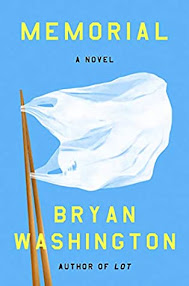MEMORIAL (2020)
By Bryan Washington
Riverhead Books, 306 pages.
★
Should a reviewer cut a gay novel more slack than one involving straight characters? How about if one of the characters is African American and the other is Japanese? Or should that reviewer simply call it like it is and say he is in the presence of a bad piece of writing? Given that I am the reviewer in question, I opt to call Memorial a dud.
It details the relationship between Benson, a black American, and his Japanese partner “Mike.” They have a lot of sex together, though mostly for the wrong reasons. Sex is what they do when they can’t communicate or resolve their disagreements, which is nearly all of the time. Memorial is set in Houston, where Mike has been for a long time and where “Ben” grew up in some comfort. They now live in the city’s Third Ward, a classic gentrifying but not yet transformed neighborhood. Mike, who comes from a broken home, is a slacker who goes from one low-wage restaurant to another. Ben—who is HIV positive-—works in a daycare center and is good with the kids, though he’s pretty lousy with most adults, including Mike. Not that Mike is much better. If you don’t already think that the F-bomb has grown boorish and tiresome, you’ll be ready to call for an outright ban if you pick up this novel. Take it out and this book would lose half its bulk.
Nothing much makes sense in the book. Mike’s mother Mitsuko is jetting her way from her home in Tokyo to Houston where she once lived. So what does Mike do? He flies to Osaka to care for his father Eiju, who has terminal pancreatic cancer. Is that noble? Not really; he despises his father and hasn’t even spoken to him in years. Plus, what kind of partner sticks his boyfriend with his mother, whom Ben has never met, to go to Japan for several months? Ben doesn’t even know if Mitsuko speaks English. She does and expresses disapproval about everything from her ex-husband to Ben and the apartment.
Washington tries to salvage the novel about half way through by switching from the Mike/Ben relationship to back stories that flesh out their respective dysfunctional families. This includes Mike’s attempt to help his father run his small bar, much to the chagrin of Kunihiko who has been a surrogate son to Eiju and hoped to inherit the bar. For the record, Eiju speaks with the same expletive-laced overgrown junior high school vocabulary as Mike and Ben. If none of this makes any sense to you, trust me that it’s not worth trying to understand it any more than trying to rationalize Mike’s casual hookups in Osaka or Ben’s attraction to Omar, the brother of a sullen child named Ahmad with whom only Ben can relate.
Yeah, yeah, there is a sort of coming together of the respective families, but do we care? I surely did not. Nor did I care whether or not Mike decides to go back to Osaka after his father’s death, a subplot involving the forthcoming marriage of one of Ben’s colleagues, or whether there is any hope for Mike and Ben.
It’s this simple. Unless you’re David Mamet and can concoct compelling drama to accompany foul-mouthed characters, the F-bomb is not cutting edge literature. I know nothing about author Bryan Washington. Maybe he has a great novel in him somewhere, but Memorial is a boring book marred by immature writing. Mike and Ben remind me of something Tom Lehrer once said: “If a person feels he can’t communicate, the least he can do is shut up about it.”
Rob Weir








